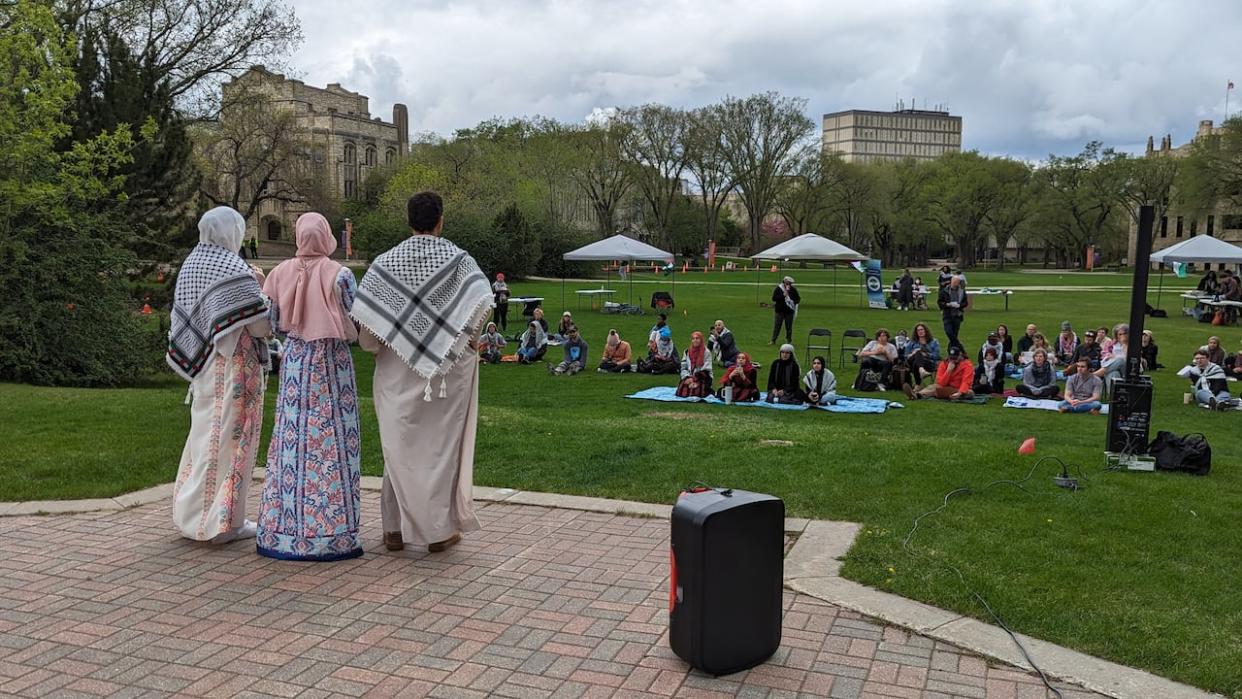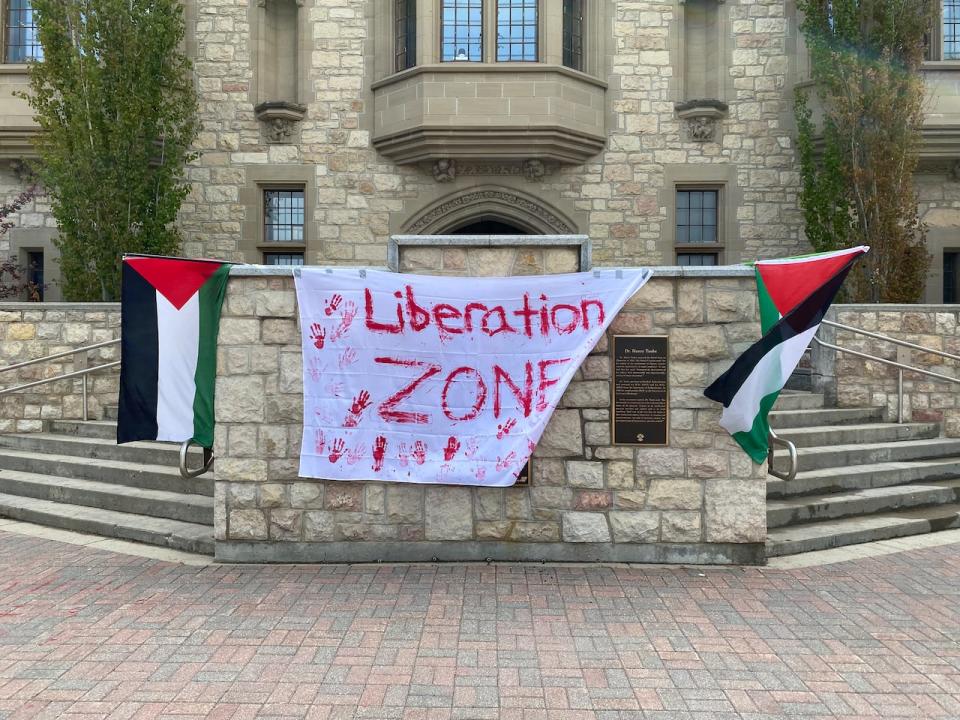Pro-Palestinian student movement arrives on Sask. campuses

A campus Palestinian solidarity movement rolled into Saskatchewan's two universities with dual events on Friday.
The all-day events at the University of Saskatchewan in Saskatoon and the University of Regina featured activities such as teach-ins, letter writing, and speeches from students, professors and Palestinians.
Protests across the country have followed others that began on campuses in the United States. At some universities in Canada, encampments have popped up, and some have been dismantled by local police.
The encampments at Canadian schools have followed months of protest marches, petitions, sit-ins and hunger strikes by pro-Palestinian movement activists since Israel's military response to the Oct. 7 attacks.
Ali Elawad is a U of R student. He said their peaceful event is meant to help counter misconceptions about the movement.
"There's no violence. There's art, there's music. It's people uniting," Elawad said.
Like other recent campus protests, the student groups are demanding that Saskatchewan universities disclose and cut any financial and research ties with Israel.

Students put up Palestinian flags at the entrance of the University of Saskatchewan administration building during a sit-in on campus on May 17, 2024. (Geneviève Patterson/SRC)
In Saskatoon, students and faculty gathered in the Bowl at the centre of campus to rally support for Gaza.
Adam Ismail is a volunteer with the group Students for Justice in Palestine. His grandparents on both sides of the family are from the region and his family makes regular trips to visit relatives.
"We've been to the West Bank multiple times. We've experienced the hardships that they face there. What's happening in Gaza is so much worse," Ismail said.
Hamas led a surprise attack on southern Israeli bases and communities on Oct. 7, in which an estimated 1,200 people were killed and some 250 taken hostage, according to Israeli tallies. Some 129 hostages remain captive in Gaza. Israel has since launched an air, ground and sea assault on the blockaded Palestinian territory, killing more than 35,000 Palestinians, according to Gaza health authorities.
Campus movement grows
These events at Saskatchewan universities follow recent campus protests and encampments in Edmonton and Calgary, as well as other post-secondary institutions across Canada.
U of S political studies associate professor Colleen Bell said students and faculty are pressuring U of S decision makers "to think about how some of our relationships with research institutes and universities in Israel might be inadvertently supporting Israel."
Bell said she's proud of students taking a stance.
"It takes a lot of courage, especially given what's happened around Canada at various universities where students who've been exercising their right to protest and academic freedom have been met with significant police repression."
The U of S administration said in a statement it met with event organizers to discuss safety issues and review campus bylaws before Friday's event.
"USask fully supports freedom of expression and academic freedom and will continue to allow demonstrations, as we have through our history and since the conflict in Israel/Gaza began," said U of S spokesperson Daniel Hallen in a statement.
Faculty assoc. pushes for divestment
U of S Faculty Association members voted to endorse the divestment and sanction campaign against Israel, and called on the U of S to support Palestinian students and scholars by offering opportunities to continue their work.
The association is a union and independent of the U of S administration, and therefore does not have much power outside of collective bargaining to compel the university to act. A committee is discussing how to pressure the administration into reform, according to a statement.
The group Faculty for Palestine Canada Regina Chapter wants the U of R to prevent Starbucks from opening a location on campus. It says Starbucks is punishing workers for expressing pro-Palestinian sentiments on social media. Starbucks is one of many businesses targeted by pro-Palestinian boycotts.
Starbucks and the union organizing its workers sued each other in October of last year in a standoff sparked by a social media post over the Israel-Hamas war.
Starbucks sued Workers United in federal court in Iowa, saying a pro-Palestinian social media post from a union account early in the Israel-Hamas war angered hundreds of customers and damaged its reputation.
Workers United said Starbucks defamed the union by implying that it supports terrorism and violence.
The long-standing movement known as Boycott, Divestment and Sanctions (BDS) seeks to put financial pressure on the state of Israel to follow international law and end human rights abuses against Palestinians.
The decades-old movement was inspired by the South African anti-apartheid movement of the 1980s and early '90s, when consumers around the world boycotted goods made in that country to pressure the country to end apartheid.


